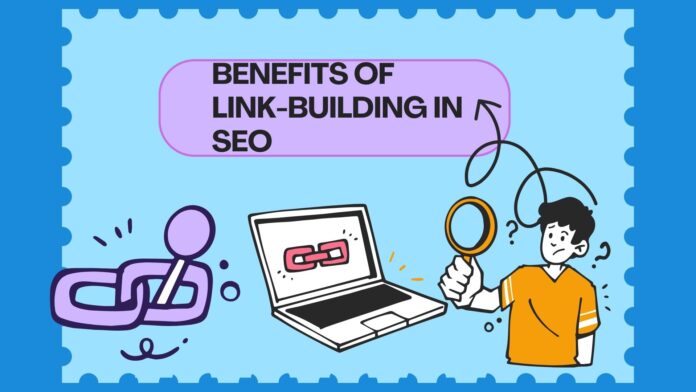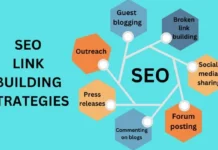A link-building strategy is a significant ranking signal that will always be seen in the new trend of SEO. Search engines, such as Google, consider backlinks to be viable factors in determining the authority and credibility of any site. Thus, those with quality, relevant backlinks earn a higher ranking in search engine results and, consequently, more traffic than organic ones.
But what is link building, and why is it so vital? How do you create links without getting penalised by search engines? This guide has it all. We’ll examine types of links, why link building is so vital to SEO, proven methods of acquiring high-quality backlinks, and pitfalls to avoid.
By completing this guide, you will find a clear roadmap for improving your website ranking through strategic linking. Let’s dive in!
What Are Links?
Links, also called hyperlinks, form the very basis on which the internet is built. It allows both users and search engines to link one web page to another. The links fall into two headings:
1. Internal Links
- Links that connect pages within the same website.
- For example, backlink a product page to a blog post.
Benefits:
- Improve site navigation.
- Support search engines to crawl and index pages.
- Skill page authority (link equity) on that website.
2. External Links
These refer from one site to another.
- Outbound Links: Links from your website to some other website.
- Backlinks (Inbound Links): Links to your website from other websites (most important for SEO).
Types of Backlinks Based on Quality
- Dofollow Links: Pass SEO value (link juice).
- The following are certain types of links, none of which have SEO value and are not passed, such as sponsored links.
- High-high links come from authority-based sites (such as .edu, .gov, Forbes, etc.)
- Low-quality links are the ones that come from spammers or irrelevant sites (they can ruin the SEO).
These distinctions are important: After all, not all links are created equal. The Google algorithm, therefore, judges the quality, relevance, and authority of a backlink when ranking a site. If you read about black hat and white hat link building, you can gain knowledge.
What is link building?
Link building refers to the process whereby one gets hyperlinks from another website to their own. It is an important aspect of the SEO strategy, as search engines treat backlinks as votes of confidence. Thus, the more good-quality links one has, the more authoritative and confident the website is.
What Do Websites Use to Link?
- Natural Links—These links come naturally owing to quality content.
- Outreach Links— These links are attained through guest blogging or influencer campaigns.
- Self-Created Links—These links are created from directories, forums, or blog comments; their overlooked use might lead to a negative impact.
How Google Judges Backlinks
Under its algorithms, Google (perhaps PageRank) considers the
- The linking website authority (Domain Authority, Trust Flow).
- Relevance (Is the linking website in your niche?).
- Anchor Text (The text that can be seen within a link).
- Link Placement (Links within the body of text are of greater value than the footer links).
Widespread Link Building Misconceptions
- More links = better ranks (quality triumphs over quantity).
- All backlinks will do (Spammy links can get you penalised).
- Link building is dead (it remains a top-ranking signal).
Now that we have a basic understanding of what links are and why they are important, let us talk about the reason link building is a core jigsaw for successful SEO.
Importance of Link Building for SEO
1. Improve Search Engine Rankings
- Backlinks play a very significant role in the ranking of pages in Google’s algorithm.
- Quality backlinks are associated with high-quality content that is considered trustworthy and credible.
- According to research, the correlation between backlinks and better rankings is evident.
2. Increases Organic Traffic
Higher rankings imply increased visibility; therefore, increased clicks on pages with strong backlink profiles.
3. Increase Domain Authority (DA) and Page Authority (PA)
- Backlinks affect Domain Authority (DA) and Page Authority (PA) scores reflected on Moz.
- Higher DA means that you would have more chances of ranking for a lot of these keywords that are considered competitive.
4. Enhanced Search Engine Indexing
- If top authoritative sites point to your content, Google indexes and crawls it much faster.
- Invaluable assistance is offered to new sites.
5. Referral Traffic & Brand Visibility
- Backlinks from popular sites can directly send visitors to you.
- Example: A mention on TechCrunch or Forbes might draw thousands of visitors that way.
6. Establishes Relationships with Industry Experts
- Working with influencers and bloggers helps to develop credibility for your brand.
- Being referred to as a source makes you an industry authority.
7. Outsmart Your Competitors
- Competitors’ backlink analysis will help you find gaps in your strategies.
- You can also find out how your competition gets their links through tools such as Ahrefs & SEMrush.
8. Long-Term SEO Benefits
- Unlike paid advertising, backlinks bring in long-term traffic over time.
- A strong backlink profile keeps your rankings stable even during algorithm updates.
How to Do Link Building for SEO
1. Produce Link Worthy Content
- Publish in-depth guides, case studies, and original research.
- Example: a detailed 5,000-word guide on an emerging topic.
- Also, leverage infographics, videos, and interactive content to earn natural links.
2. Guest Blogging
- Guest blog on authority blogs in your industry.
- Insert a backlink in the author bio copy.
- Avoid spammy guest blogging networks.
3. Broken Link Building
- Find broken links on relevant sites using Ahrefs or Check My Links.
- Then reach out to the webmasters and offer your content as a replacement.
4. HARO (Help a Reporter Out)
- Join HARO and respond to journalists.
- Then be shown in news articles with backlinks.
5. Backlink Competitor Analysis
Spill on competitor backlinks using Ahrefs, SEMrush, or Moz.
Reflected on their outreach, their top links would be.
6. Local SEO and Directory Submissions
- Submit to the top directory sites available (for example, Yelp, BBB, Chamber of Commerce).
- Helps in local rankings.
7. Forum and Q&A Participation
- Post on Quora, Reddit, and niche-specific forums.
- Answer credibly with related links.
8. Social Media
- PBNs (private blog networks) (unsafe and prohibited).
- Spam blog comments & forum link drops.
Frequently Asked Questions
Q: How many backlinks do I need to rank?
A: Quality before quantity. Several good backlinks can trump hundreds of poor ones.
Q: Are nofollow links of no use?
A: Not! They will still pass on referral visitors and help in keeping the diversity in your linking profile.
Q: How long does it take for link building to show effect?
A: SEO calls for patience. Look out for somewhere around 3 to 6 months to see some notable change in ranking.
Q: Would I be able to recover from a Google penalty if I had bad links?
A: Yes, Google’s Disavow Tool can help eliminate any sort of spam backlinks.
Conclusion
Building links ranks the highest among effective strategies in the SEO arsenal for raising rankings, driving traffic, and building authority. By targeting worthwhile backlinks, producing useful content, and conducting ethical outreach, a strong and sustainable foundation of backlinks can be created.
Avoid shortcuts like buying links or the use of PBNs, and get into a penalty instead. Rather, commit to long-term strategies like guest blogging, HARO, and broken link building.
Since you have now discovered the importance of link building, it is now time to start doing it and making your link-building efforts add more to your SEO success!









